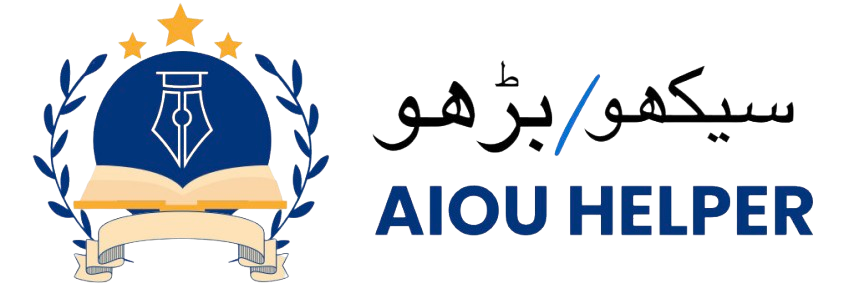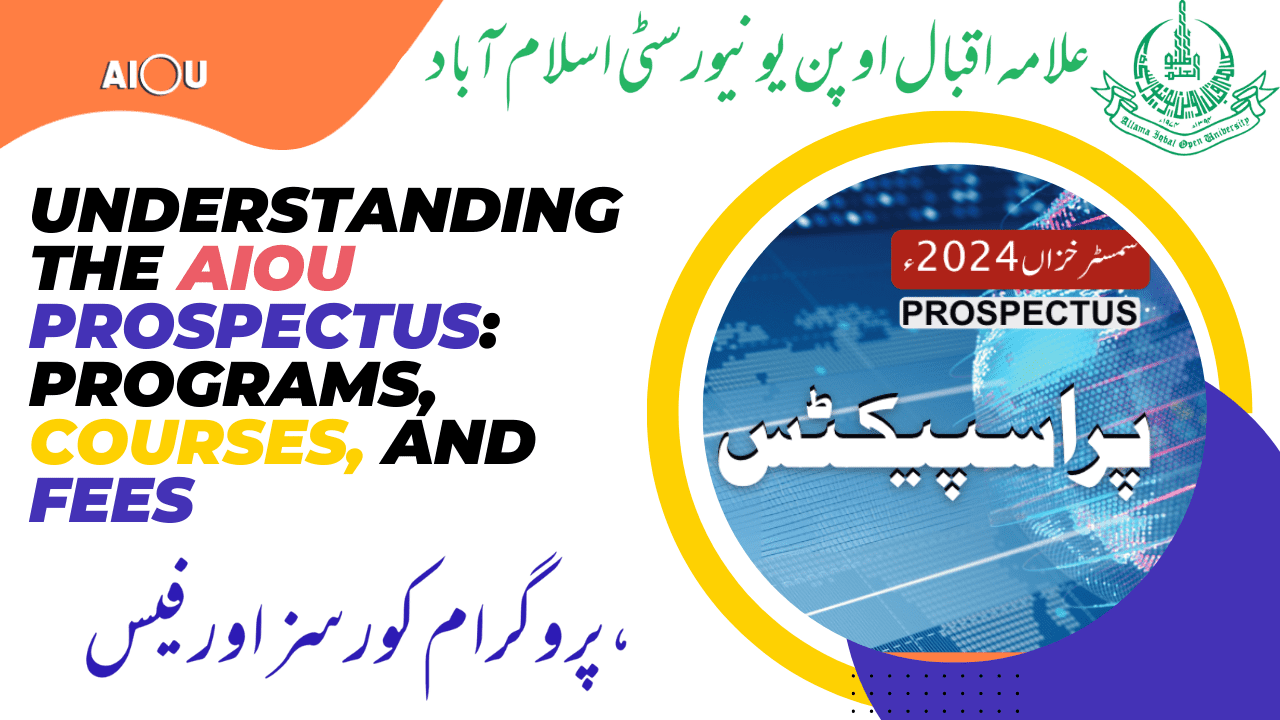Understanding the AIOU Prospectus: Programs, Courses, and Fees | By AIOU Helper
Allama Iqbal Open University (AIOU) is one of the largest and most prestigious open universities in Asia, providing flexible and accessible education to millions of students. AIOU offers a wide range of programs, from basic education to advanced postgraduate degrees. The university’s prospectus is an essential guide for prospective students, outlining the programs, courses, and fee structures. This article provides an in-depth look at the AIOU prospectus, helping you understand the various academic opportunities and financial requirements.
Introduction to AIOU
Established in 1974, AIOU’s mission is to provide quality education through distance learning, catering to those who cannot attend traditional universities due to geographic, financial, or personal constraints. The university’s innovative approach to education makes it possible for students to pursue their academic goals while managing other responsibilities.
Structure of the AIOU Prospectus
The AIOU prospectus is a comprehensive document that details everything a prospective student needs to know about the university’s offerings. It typically includes:
- Introduction and Overview: Information about the university, its mission, vision, and objectives.
- Programs Offered: Detailed descriptions of all the academic programs available.
- Course Descriptions: Information about the courses within each program.
- Fee Structure: Breakdown of fees for each program, including tuition, registration, and other charges.
- Admission Criteria: Eligibility requirements for each program.
- Application Process: Step-by-step guide on how to apply for admission.
- Contact Information: Details on how to reach the university for further inquiries.
Programs Offered at AIOU
AIOU offers a wide array of programs catering to diverse academic interests and career aspirations. The programs are categorized into several levels:
Basic Education
- Matriculation (Secondary School Certificate): Equivalent to high school education, preparing students for higher secondary education.
- Intermediate (Higher Secondary School Certificate): Prepares students for undergraduate studies.
Undergraduate Programs
- Associate Degree Programs (ADP): Two-year programs in various fields such as commerce, business administration, and arts.
- Bachelor’s Degree Programs: Four-year programs in disciplines like sciences, arts, education, and technology.
Postgraduate Programs
- Master’s Degree Programs: Two-year programs in fields such as business administration, education, sociology, and more.
- MPhil Programs: Advanced research-oriented programs in various disciplines.
- PhD Programs: Doctoral programs for in-depth research in specific fields.
Professional and Vocational Programs
- Diploma and Certificate Courses: Short-term programs focusing on skill development in areas like information technology, mass communication, and more.
“All AIOU Programs Prospectus Available Here (https://www.aiou.edu.pk/prospectus)”
Course Descriptions
Each program comprises various courses designed to provide comprehensive knowledge and skills in the respective field. The prospectus provides detailed descriptions of each course, including:
- Course Objectives: What students are expected to learn.
- Course Content: Topics and subtopics covered in the course.
- Assessment Methods: How students will be evaluated (e.g., exams, assignments, projects).
For example, a Bachelor’s degree in Business Administration may include courses like Principles of Management, Financial Accounting, Marketing, and Organizational Behavior.
Fee Structure
Understanding the fee structure is crucial for prospective students to plan their finances. The AIOU prospectus provides a detailed breakdown of the fees for each program, including:
Tuition Fees
- Per Credit Hour: Charges based on the number of credit hours for each course.
- Total Program Fee: The overall cost for completing the entire program.
Registration and Admission Fees
- One-Time Fees: Initial charges for admission and registration.
Examination Fees
- Per Course: Fees for taking exams in each course.
Miscellaneous Fees
- Library Fees: Charges for library access and resources.
- Technology Fees: Costs associated with accessing digital resources and online platforms.
Financial Aid and Scholarships
AIOU offers various financial aid options and scholarships to support deserving students. The prospectus provides information on eligibility criteria and application procedures for financial assistance.

 Admission Criteria
Admission Criteria
Each program at AIOU has specific eligibility requirements. The prospectus specifies the requirements, which might include:
- Educational Qualifications: Minimum academic requirements for each program.
- Age Limit: Age restrictions for certain programs.
- Work Experience: Relevant experience required for professional programs.
For example, admission to a Master’s program may require a Bachelor’s degree in a related field, while a PhD program might require a Master’s degree and a research proposal.
Application Process
The application process for AIOU is detailed in the prospectus, guiding prospective students through each step:
Step 1: Program Selection
Select a program that matches your educational background and professional aspirations.
Step 2: Eligibility Check
Verify that you fulfill the eligibility requirements for the chosen program.
Step 3: Online Application
- Account Creation: Create an account on the AIOU admission portal.
- Form Filling: Complete the online application form with accurate information.
- Document Upload: Upload scanned copies of required documents (e.g., educational certificates, CNIC/B-Form).
- Fee Payment: Pay the application fee through the specified payment methods.
Step 4: Submission
Submit the completed application and keep a copy of the confirmation receipt.
Step 5: Follow-Up
Track the application status through the admission portal and respond to any additional requests from the university.
Key Considerations
Deadlines
Adhering to application deadlines is crucial. The prospectus provides specific dates for application submission, entry tests, and other important milestones.
Equivalence Certificates
Applicants with foreign qualifications must obtain equivalence certificates from the Higher Education Commission (HEC) of Pakistan.
Entry Tests and Interviews
Some programs may require entry tests or interviews. Prepare for these assessments as per the guidelines provided in the prospectus.
Conclusion
The AIOU prospectus is an invaluable resource for prospective students, providing comprehensive information about programs, courses, and fees. By thoroughly understanding the details outlined in the prospectus, you can make informed decisions about your academic future at AIOU.
Whether you are a fresh school graduate, a working professional, or someone looking to enhance your qualifications, AIOU offers a diverse range of programs to cater to your educational needs. By following the application process and adhering to the guidelines provided, you can embark on a successful academic journey with Allama Iqbal Open University.
FAQs
1. Where can I find the AIOU prospectus?
The AIOU prospectus is available on the official AIOU website under the “Admissions” section.
2. How often are admissions open at AIOU?
AIOU offers admissions twice a year, for the Spring and Autumn semesters.
3. Can international students apply to AIOU?
Yes, AIOU accepts applications from international students. They may need to fulfill additional requirements such as equivalence certificates.
4. Are there any age limits for AIOU programs?
Most undergraduate programs do not have age limits, but some postgraduate programs may have specific age requirements.
5. What financial aid options are available at AIOU?
AIOU offers various scholarships and financial aid programs. Comprehensive information can be found in both the prospectus and on the AIOU official website.
6. How can I contact AIOU for further inquiries?
Contact information for AIOU is provided in the prospectus and on the official website, including email addresses and phone numbers for various departments.

